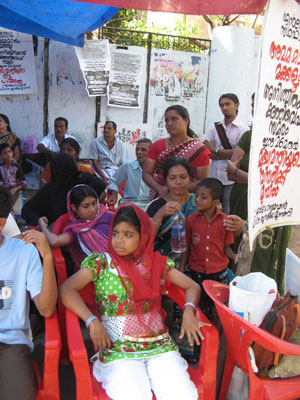
TO VOTE OR NOT TO VOTE: Delegates to MoP of Stockholm Convention vote on whether to take a vote on listing, by raising flags, in Geneva on Saturday. Photo: Secretariat of BRS Conventions
India has been blocking moves at the Conference of Parties of the Stockholm Convention on Persistent Organic Pollutants to list more chemicals for elimination from worldwide use. This precipitated a division for the first time in the history of the Conference— which used to take decisions by consensus, at Geneva on May 16, 2015.
The vote was for listing of pentachlorophenol, an organochlorine compound used as pesticide and disinfectant, for elimination (which will lead to ban on their production and use by member countries). Residues of the pesticide have been detected in the environment in wildlife and human biomonitoring studies.
Switzerland pressed for a vote on listing of pentachlorophenol after efforts to reach a consensus failed. The Conference first took a vote on whether matter should be decided through division. Then it voted 94 against two in favour of listing with eight abstaining. The decision is not binding on India.
The Conference this time was part of combined meetings of Basel, Rotterdam and Stockholm conventions. India opposed listing of trichlorfon at the Conference of Parties of the Rotterdam Convention on the Prior Informed Consent Procedure for Certain Hazardous Chemicals and Pesticides in International Trade also, leading to deferment of decision for want of consensus. India was the only country to oppose the proposal.
It was after much remonstrance that India agreed to the resolution on elimination of endosulfan in 2011 with riders (specific exemptions that included use on multiple crop-pest complexes). Though the Convention came up with alternatives to endosulfan as decided at its 2011 Conference, India is yet take steps for ratification of the decision through approval of Parliament. This was despite findings of serious harm caused by the pesticide in Kerala and Karnataka, and possibly in West Bengal and Tamil Nadu also.
Observers had alleged that representatives of the pesticide lobby were present in the Indian delegation at the 2011 Conference of Parties to prevent the listing of endosulfan. It is not yet known whether similar situation arose this year also with new government in power. However, it is very clear that India’s opinion at the International fora is dictated by the interests of pesticide companies rather than its population or the world at large.
Regulation is lacking or unenforceable (for want of proper enforcement machinery, laboratories and political will) in India though a substantial portion of the food consumed in the country is contaminated to various levels. Pesticides are often applied unnecessarily and in excess of recommendations in agriculture fields as well as godowns in most States. A national level analysis by government of more than 16000 samples of vegetables, fruits, spices, grains and other food items showed that more than 500 samples had pesticide residues above the limits prescribed by Food Safety Standard Authority of India.



